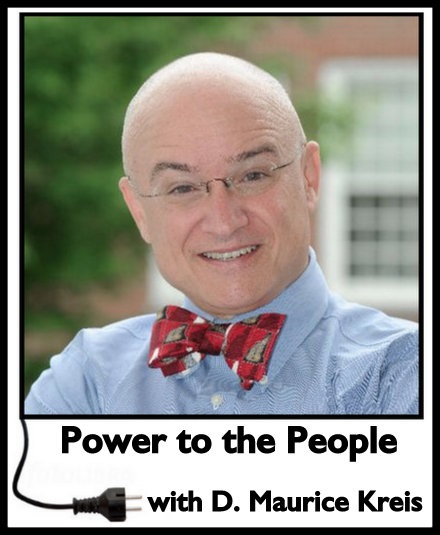Please sign up for InDepthNH.org’s free weekly newsletter and weekender by clicking here.
By D. Maurice Kreis, Power to the People
Welcome to tax season, fellow ratepayers!
While we are all working on our individual tax returns, there are some important developments brewing on the taxation front with respect to public utilities. They all come down to this ineluctable reality: Utilities don’t pay taxes, ratepayers do.
Perhaps the best illustration has to do with the recent tax reform bill, which reduces the top federal income tax rate paid by corporations from 35 to 21 percent. Utility regulators everywhere treat taxes as an expense utilities can recover from customers via rates.
So, as the official advocate for New Hampshire’s residential utility customers, my office has joined essentially all of our counterparts around the country in asking regulators to pass the effects of tax reform straight through to ratepayers. Happily, the NH Public Utilities Commission has opened a docket for precisely this purpose.
There are also two natural gas rate cases – one involving Liberty Utililties, the other Unitil – that are nearing their conclusion. In each one, the tax relief will be reflected in whatever rates the PUC ultimately approves.
Another welcome development has to do with property taxes. Just as with income taxes, the property taxes each utility pays in connection with the facilities it owns in various municipalities are a part of the monthly bills each customer pays.
House Bill 1381 would, if adopted, end a most unwelcome practice in which some municipalities have relied on unreasonably aggressive valuation methods to jack up utility property tax bills. If the bill becomes law, it will no longer be possible for those municipalities to use utility taxation to balance their budgets on the backs of ratepayers in other towns and cities.
In its amended form, House Bill 1381 reflects an all-too-rare phenomenon: compromise. Find more information about HB 1381, which has a House floor vote on Tuesday, by clicking here.
Members of the state’s Assessing Standards Board, and then legislators, worked hard to address the concerns of municipalities – especially those that host a lot of utility property. Some municipalities would lose but others would gain if the proposal becomes law. The changes would be phased in over five years to give affected municipalities time to adjust.
Overall, the bill won’t actually save ratepayers much money. The measure would be revenue-neutral to the New Hampshire Electric Cooperative, for example.
So what’s to like? There would be a rational, uniform and objective standard for determining what utilities owe in taxes – a formula based on each asset’s original cost and net book value.
These terms probably don’t mean much to those who are not up to their neck in utility rate cases like I am. But, trust me, basing a utility’s property tax bill on original cost and net book value (which is original cost less accumulated depreciation) is vastly more fair to consumers than what we have now.
Because what we have now is a town-by-town system that rewards those municipalities that hire especially aggressive tax assessors – ones who specialize in making utility assets look as valuable as possible – and follow that up by hiring aggressive lawyers who litigate these things all the way to the New Hampshire Supreme Court if necessary.
Taxpayers and utility customers alike – in other words, all of us regular citizens – will benefit if we can put a stop to these struggles because one way or another we all pay for them. The assessors and the lawyers do not work for free.
“It is extraordinarily difficult to value public utilities,” admitted New Hampshire Supreme Court Justice Robert Lynn (Governor Sununu’s nominee to be the next Chief Justice) in January. He made that observation in the course of the opinion he wrote for a unanimous court in a case entitled Public Service Company of New Hampshire v. Town of Bow.
Bow is – or was – the home of lots of PSNH assets, notably the coal-fired Merrimack Station. The town hired one of those aforementioned valuation experts who works in an aggressive mode. The lower court sided with PSNH and, thus, its customers (agreeing with PSNH, by the way, that relying on net book value was appropriate).
Ironically, the decision came one day after PSNH (now doing business as Eversource) sold Merrimack Station to a non-utility buyer. That transaction, along with the impending sale of the company’s hydroelectric generation assets, is the end of an era. Twenty-two years after the Legislature opted for restructuring, it will finally be true that ratepayers are no longer responsible for the business risk associated with generation assets.
That makes 2018 an especially fitting time to solve the problem of utility asset valuation for tax purposes. Since generation facilities are no longer utility-owned, they are not covered by House Bill 1381.
For those assets that do remain in utility rate base – and thus remain part of the utility bills we all pay – a fair, rational and consistent system for determining the correct tax bill is good public policy. Ratepayers will have reason to celebrate if House Bill 1381 is signed into law.
D. Maurice Kreis is New Hampshire’s Consumer Advocate, tasked by statute with representing the interests of residential utility customers before the PUC and elsewhere. He writes the “Power to the People” column for IndepthNH.org. Power to the People is co-published by InDepthNH.org and Manchester Ink Link.





